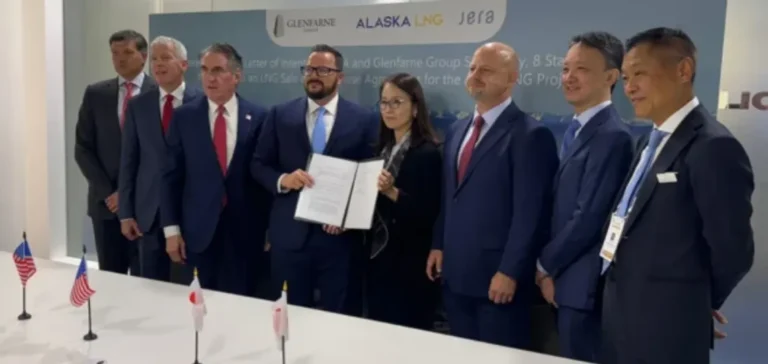Japan’s largest electricity producer, JERA, has confirmed the signing of a letter of intent with US-based company Glenfarne for the purchase of liquefied natural gas (LNG) from the Alaska LNG project. The agreement covers the supply of one million tonnes annually over a period of twenty years, although a Final Investment Decision (FID) has yet to be announced.
A politically and financially backed project
This agreement forms part of a broader bilateral trade deal between the Japanese and US governments. Tokyo has committed to increasing its long-term purchases of US hydrocarbons, at a time when energy source diversification is positioned as a strategic priority. The Alaska LNG project, with an estimated cost of $44bn, includes the construction of a 1,300-kilometre pipeline connecting the state’s north and south.
Backed by Glenfarne, the infrastructure aims to export processed gas to Asia in LNG form, which remains the primary target market. According to published timelines, commercial deliveries could begin in 2026, assuming financial and regulatory decisions are secured within the expected schedule.
JERA seeks to secure long-term supply
In a statement, Glenfarne’s Chief Executive Officer said the agreement with JERA marked a key development for the Alaska LNG project. The company is targeting a final investment decision by the end of the year. This milestone is considered essential to securing Asian buyers and completing project financing.
For JERA, the agreement could provide a stable supply source beyond the Middle East, which currently accounts for the majority of its imports. Japanese government spokesperson Yoshimasa Hayashi stated that the competitiveness of US LNG would expand Japan’s import options, though he did not provide a specific timeline for project implementation.
Technical and commercial uncertainties remain
The Alaska LNG project still faces multiple challenges, including engineering questions, environmental permitting and the logistical costs of gas transport. At this stage, no binding contracts have been signed, and the letter of intent only provides a basis for future discussions, according to both companies.
JERA executive Ryosuke Tsugaru noted that the group would continue its technical and economic assessments before making any firm commitments. He added that the company expected greater clarity on the project’s terms before moving to the next phase.






















